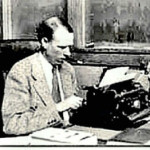Summer School- How To Write Your Peace Corps Book, Lesson # 1
For the next two week, Monday through Friday, I will give you suggestions on how to write your Peace Corps Book. If you wish, you can also put into the ‘Comment’ Section of the blog the first paragraph, page or chapter of your book and I’ll comment on it, as will, I hope, other RPCVs. This class (I hope) will get you started writing your novel or memoirs on your Peace Corps experience.
In this first lesson, I am going to focus on two topics: Becoming a Writer and Getting Started. As Fran Lebowitz, author o Metropolitan Life once said,
It’s really scary just getting to the desk. My mouth gets dry, my heart beats fast. I react psychologically the way other people react when the plane loses an engine.
.
Jacques Barzun who taught at Columbia University and wrote wonderful books, wrote this about becoming a writer:
Convince yourself that you are working in clay, not marble, on paper, not eternal bronze: let that first sentence be as stupid as it wishes. No one will rush out and print it as it stands. Just put it down; then another. Your whole first paragraph or first page may have to be guillotined after your piece is finished: but there can be no second paragraph (which contains your true beginning) until you have a first.
Reading as a Writer
Learn to “read as a writer.” It is difficult and time-consuming. You are, however, no longer a member of the audience. You must step backstage and learn how the magician casts the spell. As you read, remember the words of Samuel Johnson, “What is written without effort is in general read without pleasure.”
In your case, read books written by other Peace Corps writers. See how they did it. And they did it in different ways. There are many ways to write the Peace Corps story.
Getting Started
A Famous Story
Addressing a lecture hall filled with aspiring student writers at Columbia University, Sinclair Lewis was asked to talk about the writer’s craft. He stood at the dais and addressed the young hopefuls: “How many of you here are really serious about being writers?” The writer watched as a sea of waving hands shot up. “Well, why . . . aren’t you all home writing?” he asked. With that, Lewis walked out of the room.
Here are some basic tips on writing that will help you as you write your book:
- Write at the same time every day, and don’t try to write too much.
- Never wait until you “feel like writing.”
- Turn off all distractions, like email or the evening news.
- If you can carve out a half an hour a day, you will have carved out some 182 writing hours for the year.
- Set a goal for yourself, like a minimum number of words, to write each day.
- Try to produce one page (about 300 words) a day, and within one year, you’ll have a manuscript of about 100,000 words.
- End each session in mid-sentence or mid-paragraph so you’ll have an easier time starting the next day. That’s what Hemingway did all his life.
- Keep your reference books close. But when you are writing, don’t stop to check facts along the way. Make a note to consult your research materials later.
- Talking about your writing often means you aren’t writing.
.
Personal Material
It is possible – and it has been done – to write a memoir consisting of a collection of letters, called an epistolary book. A number of RPCVs, as well as parents of RPCVs, have done this. In 1999, Dear Exile: The True Story of Two Friends Separated (For A Year) by an Ocean by Kate Montgomery (Kenya 1996-97) and Hilary Liftin was published by Vintage Books. This collection of letters received some good reviews and sold well. The two women had a “hook” which was fresh and innovative – one friend was in Africa with the Peace Corps, the other was in New York. After reading the book I had the feeling that the Toughest Job You’ll Ever Love was living in New York City, not being a PCV in Kenya. But that might have been because the non-PCV, Hilary Liftin, was the real writer of the two friends.
In 2002, Jane Baker Lotter (Staff spouse: Malawi 1965-67) self-published “letters home” that she had written to a family friend with the title To Africa with Spatula: A Peace Corps Mom in Malawi. It is a charming small book and unique in being her perspective of the Peace Corps experience. I can also think of a half dozen other books of Peace Corps letters written over the years, the first being published in 1964 called, naturally enough, Letters from the Peace Corps. This was a collection of letters from various PCVs and was edited by Iris Luce who worked at the Peace Corps Office in Washington. I have that book because it includes an “unsigned” letter from me to my family back in Michigan.
All of that said, I am not a fan of such epistolary books, and I think that getting a book published that details your Peace Corps experience would be extremely difficult. In the more successful Peace Corps books, including the ones that you have just read for this class, the authors have taken their letters home and used them as source material for their books. If you have some of your letters home, what you have to do is use them to bring your experience back from your subconscious.
Oh, you say, “I don’t have any letters home,” or for that matter, “I didn’t keep a journals of those years overseas!”
That’s okay. Bob Shacochis (Eastern Caribbean 1965-68), who wrote Easy in the Islands, an award winning collection of short stories published in 1985, said he had taken a journal with him to the Eastern Caribbean and had never written a word in it. Mark Brazaitis (Guatemala 1990-93) who won the 1998 Iowa Short Fiction Award for The River of Lost Voices told me that in his last days in his village he wrote furiously, afraid that he would forget what he knew, but when he returned to Ohio to get his M.F.A. in Creative Writing from Bowling Green State University and sat down to write again, all of his experiences came back to him.
If that is what happened to you, don’t worry, because from your deep well of remembrances you will find what you want to write and you will write it.
Okay, let’s get writing!
John, Thanks for taking the time and making the effort to do this.
I joined the Peace Corps but returned with a war story. Filling out that application fifty years ago, I asked for sub-Saharan Africa. I imagined myself as one of those magazine ads at the time— blond and boyish in horn-rimmed glasses, teaching a sea of attentive black faces in an open-air classroom somewhere in the bush. This all started when I was a kid and collected those spellbinding stamps with the majestic animals and gorgeous flowers from exotic places like Tanganyika and Ghana. Before long, I could draw the map of the Africa freehand and name all its capitals. I had followed the colonial independence movements in the sixties closely but I didn’t realize how much it was also my independence that I was after. I knew I would go to Africa with a lot of information but I didn’t know how naive I was. So in May, 1966 I left New York for Nigeria. A year later I was in another country called Biafra. After some harrowing last days there, I was lucky to get out alive.
John!
What a great idea. . . .good luck with it.
My favorite Hemingway adage, which you include, is to stop writing when the going is good. That way you pick up the manuscript the next day with brio. But if you prolong writing so as to meet your dedicated 1000-words-a-day goal, you’ll soon loathe what you’ve written. Writing becomes an obligation rather than a joy.
Another tip: always read aloud what you’ve written. That way you find your “voice.” And a voice or special style is what marks every good writer.
I am not a famous writer, Peace Corps or otherwise. Nor have I been successful if you measure it by output and units sold. My collection of essays, “Unhinged,” received a decidedly mixed – although leaning to the negative – review on this site. I think the reviewer was wrong, but what would you expect me to say? Nevertheless, after a career as a journalist I am now writing for my own enjoyment and satisfaction. I write, therefore I am.
I am never so pleased as when the writing is going well; when I nail the exact turn of phrase that had been eluding me and when the clumsy, awkward first drafts are transformed, through rewriting and constant tweaking, into something really quite nice. I don’t know exactly how that process works, what neural synapses start firing or how the piece of coal I’ve been staring at is transformed into a diamond (okay, maybe cubic zirconia).
It’s alchemy. If I were presumptuous enough to give advice to writers, it would be to rewrite constantly. Your stuff can only get better, unless you’re a complete patzer. Don’t allow the perfect to be the enemy of the good. And if your mom tells you your stuff is wonderful, get a second opinion. With all due respects to moms.
And by the way, I have no intention of writing a Peace Corps book. I leave that to others.
Awesome and not what i expected when I decided to be a Volunteer again after my first tour 1964-1966. In 2009 I knew it was time to try my hand…being older did not mean I was any smarter. I learned something, having served between 2009 to 2015 in Panamà twice, Paraguay, and back “home” in Colombia. I saw and learned that the Volunteer is the same, and full of beautiful ideas, like the 1960’s. Their expectations of me was what they expected of other Volunteers, nothing less. In my 70’s, I felt needed and full of new ideas and energy. These Volunteers made a difference in my life.
That’s what I want to “write” about…the beauty of being a Peace Corps Volunteer again, and proud what it has meant to our adopted communities and our family and friends. Where would any of us be, had there never been a Peace Corps?
Count me in, excellent idea and summer (winter in Panamà) challenge. Where do I sign up?
I just found this lesson. Just what I need right now. I’ve never been a Peace Corps Volunteer, yet the Peace Corps has forever changed my life. I have a story if only for me.
For Nick Castle-Peace Corps China 18-1990-2013